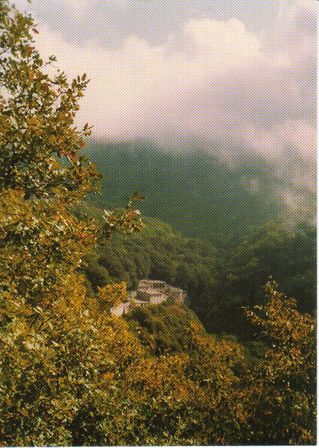History

St Francis
Prayer
St Francis was a great mystic and spent over half of each year in hermitages or remote places where his primary focus was to give himself to God in prayer.
Creation
There is his love of Creation which led him to rejoice and praise the Creator; his loyalty to the church, despite its worldliness and wealth; and so the list goes on as we gaze into this beautiful jewel that God has given us in the person of St Francis.
His early life
His young adult life
His ministry
The great preacher

The Angelus
The Angelus has taken the form of a bell being tolled in three sets of three and then one of nine with a pause between each set. There are prayers that can be said with the ringing of the bell. Most important of all is the directing of our attention at the beginning of the day, at midday and at sunset to the mystery of the Creator entering his own creation in order to reveal His great love for us. The Angelus then invites us to join St Francis and countless others to be lost in love, wonder and praise at this great mystery.

The Desert Fathers
The teaching of the Desert Fathers, passed down through their disciples, is in the form of anecdotes, the “Sayings of the Desert Fathers”, and in the biographies or “Lives” written by those who wanted to preserve the traditions of the “old men and women” of the desert. Although the early monks led an austere ascetical life, there is at the same time a radical simplicity and commonsense in their teaching. It was said of St Anthony that one day he was relaxing with his brothers outside the cell (hermitage) when a hunter came by and rebuked him. Anthony said, “Bend your bow and shoot an arrow” and he did so. “Bend it again and shoot another”, and he did – and again and again. The hunter said, “Father, if I keep my bow always stretched, it will break.” “So it is with the monk” replied Anthony: “If we push ourselves beyond measure we will break; it is right from time to time to relax our efforts.”
At the heart of the life of the Desert Fathers was the commitment to prayer. If a life is oriented to the things of God, the driving force of that life is prayer. The aim was a quiet reflective prayer complemented with simple work that would provide for the monk’s basic needs – weaving ropes and mats or making sandals. They aspired to live the Gospel life in a straightforward and uncomplicated understanding of Christ’s teaching. Their gentle evangelical charity was the pivot of their work and the test of their life in the desert. Their pattern of hospitality was to receive guests as Christ would receive them. To pattern ourselves on Christ is their challenge to us.

The Quest for Solitude
There are two sides to seeking solitude. There are those who are running away from something; and there are those who are running after something.
The first are those who seek solitude as a relief from their frenetic and busy lifestyles in the city with its crowds, noise, the stress of the workplace and hectic social life. They seek times and places of solitude for rest and renewal. For them, solitude is an end in itself.
Then there are those who seek solitude because they are running after something. Monks, nuns and hermits seek solitude to find someone.
My soul is a thirst for God, athirst for the living God. (Psalm 42:2)
Dry as a thirsty land, I reach out to you. (Psalm 143:6)
Detachment from competing interests is necessary, both externally and internally. So solitude provides that environment for this to happen in our desire for a more intimate relationship with God.
Sometimes when we approach a person and wish to speak with them personally, we will ask them “Are you busy?” or we will knock on the door of the office and ask “Are you alone?” meaning “Are you free and disengaged?”. This is what is being sought in solitude.
The privacy of the room, to which our Lord bids us to go and to shut the door to seek God’s face in prayer, has a depth beyond a warning against spiritual pride. The room, like solitude, is a necessary place of separation conducive to being attentive and focussed on Him speaking to us.
